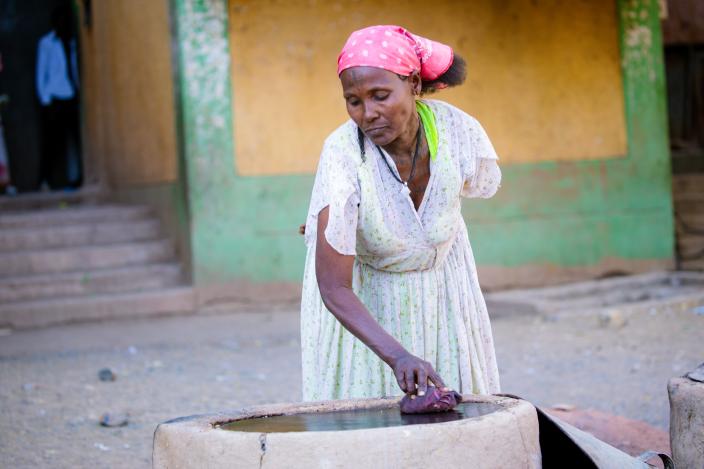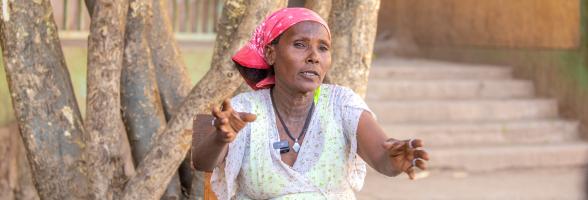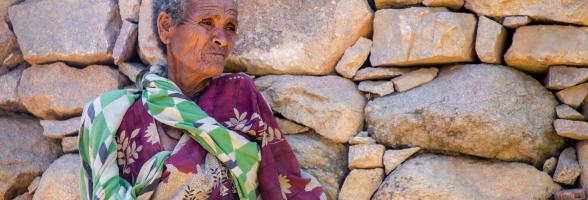Within a confined space of a single classroom, Hareyat Gebrelibanos, a 50-year-old mother of four girls is reorganising and cleaning her space at the far right of the class, attempting to make it comfortable for her daughters.
The classroom now turned Internally Displaced Camp (IDP) camp is a mere 30 square meter space. Hareyat not only lives with her four daughters but also with 50 other people separated only by a flimsy cloth strung between them.
"I used to live in Tsegede, Western Tigray which is now occupied by forces, they came and looted everything destroying everything in their wake,” recounts Hareyat.
Once a vibrant place for children’s laughter and learning, Meles Preparatory school, located in Abiy Adiy town, 90 Km from Mekelle in Tigray has turned into a place of refuge and makeshift home, hosting thousands of people uprooted by the conflict that has been worsened by hunger due to climate-induced drought.
“When the conflict started, we were just home and then things got worse, my family and I hid in the house in the hope that things would cool down” recounts Hareyat, she added that the situation was getting worse and people, mostly men – young and old including Hareyat’s son and husband were killed by the armed groups.
Although the guns may have fallen silent in a region once troubled by war, the aftermath of conflict is etched on Hareyat’s face. After half of her family were killed, Hareyat took her daughters, fleeing with other surviving families.
“When we tried to escape, the armed group shot my eldest son and husband, they just killed them. We had to escape. I still had my young four children who depended on me, so we escaped. We did not even bury my husband and son” a visibly emotional Hareyat recounts as she breaks down remembering what happened to her family.
Escaping alongside other displaced families, Hareyat and her daughters embarked on a long and treacherous journey for survival. “We managed to get on the trucks but we were dropped in the middle of nowhere, I just remember it was near a river” she says.
Hareyat walked for two weeks to get to Abiy Adiy “We walked nearly two weeks to get here. We had very little to eat and drink, the food ran out, people were helping each other. The soldiers were killing everyone. For women we had to be in big groups as the risk of gender-based violence and rape was very high”.
Despite the ceasefire by the warring parties two years ago, the situation in Tigray is desperate. Climate-induced drought, dwindling funds, and the aftermath of the conflict continue to leave a trail of despair, with countless lives succumbing to hunger.
According to Hareyat, life in Tigray has become difficult since the conflict started. Millions are struggling to put food on their table and for Hareyat and her daughters three meals a day is a distant reality they have not experienced for a long time.
“We used to get food aid but that has reduced drastically over the last few months, some days even a meal is impossible to get, we have nothing to feed our children. Mothers are desperate and they are having to force their children to sleep longer hours so they don’t ask for food. Pregnant mothers are also giving birth in the open and sleeping on the floor” she says. Sadly, this is a reality of millions here in Tigray where millions of people like her are going hungry.
For much of the war, the region was under blockade of any humanitarian assistance. A persistent climate-induced drought has deepened the problem forcing over 3.5 million people to flee their homes in search of food and water.
“I have never seen such a bad time in my 50 years of life. We are experiencing the worst levels of hunger, many of us are lucky to have even one meal a day. There is no food and other basic supplies like health or education,” she says, laying bare the harsh reality of their dire situation at the IDP camp.
According to Hareyat the situation is so desperate that mothers are eating anything including food meant for animals just so their children could survive.
Schools and hospitals, once places of education and healing have become makeshift shelters for the countless displaced families. Many families here arrived with nothing more than the clothes on their backs. They lost their loved ones and are those who survived the war and are living on very little.
The conflict in Tigray, which started in 2020 November up until 2022, has killed hundreds of thousands of civilians. Oxfam has helped more than 400,000 people in Tigray with emergency food aid, Water, Sanitation and Hygiene (WASH)protection, and gender interventions WASH and protection activities to help them cover their immediate needs but the support continues to outweigh the needs.
Food suspension
An acute food shortage continues to grip a population already hit by two years of war and struggling with climate-induced drought. Food deliveries had resumed after a cease-fire deal after the war but the latest six-month suspension by USAID and WFP in 2023 due to an alleged food diversion has led to hunger-related deaths in the region.
“For six months, we did not receive any aid from the organisation, they used to come once in a while but for this period, there was no help, although we hear it has come back, but we have not received it here until now.” says Hareyat.
During that period until now, Hareyat says that people at the camp, mostly children and the elderly have succumbed to hunger.
The suspension comes as the Africa’s second most populous nation is struggling to feed about 20 million citizens — about a sixth of the population.
Tigray remains one of the worst humanitarian crises in the world today with local officials reporting that hundreds of Tigrayan people are currently facing extreme hunger and at risk of dying if no help comes forth.


